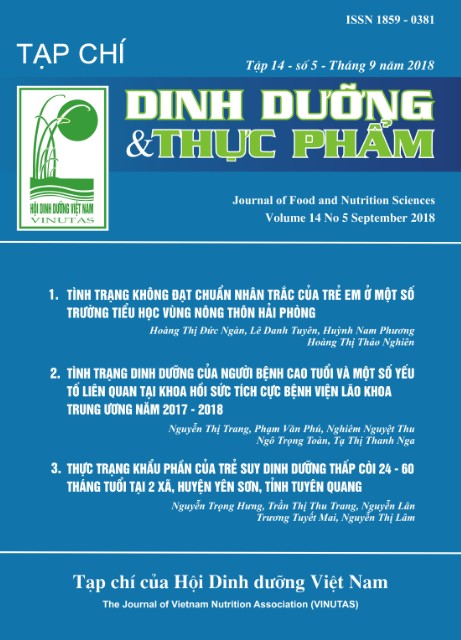A CASE STUDY: THE EFECTIVENESS OF NUTRITION INTERVENTION IN A KIDNEY TRANSPLANT PATIENT WITH ACUTE KIDNEY REJECTION IN THE 108 MILITARY CENTRAL HOSPITAL
Main Article Content
Abstract
Objective: to report an effective nutrition intervention experience in a renal transplant
patient with acute kidney rejection and severe malnutrition in The 108 Military Central
Hospital. Case situation: The 43 year-old male with kidney transplantation was diagnosed
with acute kidney rejection accompanied by severe malnutrition. Result: The second-day
post – renal replacement, the patient was diagnosed with acute kidney rejection and severe
malnutrition (SGA C; Albumin 34.6g/l; Protein 60g/l; K+ 4.1mmol/l). He was fed by exclusive oral feeding with solid and liquid diet, 4-6 meals/day, 0.6g dietary protein per kg
per day. On the 6th day, the renal function was stabilized. He was then fed by exclusive
oral feeding with solid and rice diet, the nutritional status of was improved. The testing
results on the 16th day were SGA B, Albumin 41.3g/l; Protein 66g/l; K+ 3.4mmol/l. On
the 17th day, the patient had symptoms of hyperkalemia (K+ 6.4 mmol/l). He was treated
by reducing serum potassium pills but there was no effective. He was continued to be fed
by oral supplement, under 2000 mg dietary potassium per day. On the 24th day, his blood
potassium was in normal range (K+ 4.9 mmol/l). Since the 25th day, the patient was fed
by 1.2-1.4g dietary protein per kg per day, 3500-4000mg dietary potassium per day. On
the 40th day, the health status of this patient was stable and he was discharged with SGA
A. The health indicators were in normal ranges: Albumin 41 g/l; Protein 65g/l; K+
3.5mmol/l; Ure 9.6mmol/l, Creatinin 96µmol/l. Conclusion: The intensive nutritional interventions by exclusive oral feeding and following in each health status stages have good
aspects for kidney transplant patients.
Keywords
Renal transplant, acute kidney rejection, hyperkalemia, nutritional treatment, 108 Military Central Hospital


